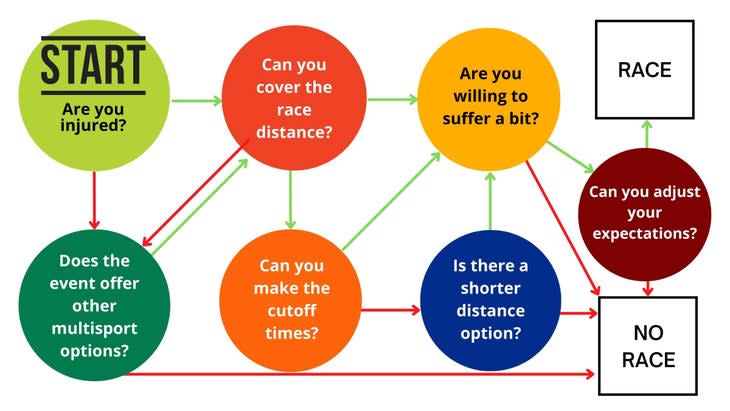Should You Start the Race or DNS? Use Our Flowchart to Decide
Triathlete
It's three weeks before race day. You've finished your last big training block and built up as much fitness as you're going to before toeing the start line. But things went wrong in the path to getting here--you got sick or or injured or busy, you missed workouts, and you look back at your training calendar and realize that, despite all your best intentions, your fitness is not where you wanted it to be. You’re under-trained.
This happens a lot with triathletes. Sometimes, the best-laid plans are derailed by busy work schedules, life events, or injury. When this happens it’s hard to know if you should still race, or is it better to pull the plug, switch distances, or even postpone your race to a new event altogether. There’s a range of factors that might affect this decision, including your injury status, your actual fitness level, the race distance, and what other options are (or aren't) available. The following questions will walk you through those factors and guide you toward a go/no go decision.

1. Are you under-trained because you are, or were, injured?
If you are--or were--injured, you need to address the injury-specific consequences of racing before evaluating everything else.
= If completing the race puts you at risk of further injury, an increased recovery timeline, or a more significant injury (as in: a stress fracture that becomes an actual broken bone), the smart choice is to change your plan: go to question four to investigate other options.
= If you're not injured, were injured but are sufficiently healed so that it doesn't pose a risk, or are still injured but are invested enough in your event that you don't care about injury-specific consequences (while I don't advise this, I've definitely lived in that headspace), then we move on to the next question.
RELATED: An Injury Guide For Triathletes
2. Can you cover the race distance?
This is simultaneously the most important question and also the hardest one to answer. There is no hard and fast, universal rule along the lines of "if you can do X in training you can do Y on race day." There are, however, three fairly universal truths:
It is easier to stretch your fitness for a short-course event (sprint- or Olympic-distance) than for a long-course event (70.3 or Ironman-distance).
For long-course events, your overall endurance base (consistency) is equally as important as your longest swim/bike/run.
If you are experienced at racing your event distance, you are the best judge of what your body can accomplish; if you believe you can do it, you are likely right.
Along with those universal truths, there are general guidelines that you can use to evaluate your race-readiness. If you have covered the following distances in training, you are likely able to bridge up to your race distance:
For exclusive access to all of our fitness, gear, adventure, and travel stories, plus discounts on trips, events, and gear, sign up for Outside+ today.]]>

